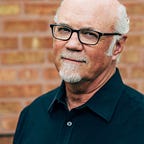The Poverty of Poetry
Not a poetry person? Don’t worry. It’s there when you need it.
I’ve been writing all my life. Not all of it has been good. And now — can you believe it? — I’m writing poems. Are they any good?
My very first writing adventure was a book made of paper mache in 2nd grade. Each student wrote their little story — bad spelling and all (everyone needs an editor, BTW) — created illustrations with watercolor paint and fashioned the front and back covers out of cardboard and glue. I still have that book. My mother saved it. The Cyclops was an undersea adventure — monsters, underwater craft, scientists, and danger. By grown-up standards, it was a very bad book. But for a little kid, I’d give it a B. The narrative was rushed, and the illustrations needed work, but it was reasonably acceptable.
Journalism came next. High school newspaper. College classes. Newswriting for the radio station on campus. Then my first career — radio journalism. That branched into print and online journalism, art journalism, and even some sports journalism. Writing books came next. That began in my 40s. And now, poetry.
Poetry?
I’d never thought as a writer that I would embrace verse.
Yet, I wonder now why I’d thought that?
Many years ago in high school, I wrote my first original song. Terrible song. The lyrics were painfully cliche. But those words were poetry, right? Bad poetry, but poetry, nonetheless. Years later, I wrote a few more songs. The music got better. So did the lyrics. But that was never going to be my career; I was never going to get rich from writing songs. In fact, I probably wouldn’t have been able to afford a cup of coffee from the royalties, if there had been any.
But here I am now, some 50 years after my first song, and I’m writing poetry. Some of it is getting published, and a collection of my poems is close to acceptance from a poetry publisher run by the poet-in-residence at Northern Kentucky University.
So, now I will be a rich poet, right?
Can you hear me laughing?
The great poet W. H. Auden said, “It is a sad fact about our culture that a poet can earn much more money writing or talking about his art than he can by practicing it.” For most poets this means a day job, a professorship, a part-time teaching gig, or working as an independent instructor or coach to other aspiring and impoverished poets. If you’re lucky, maybe you can be named a poet-in-residence at a university or an art foundation and make a few dollars lecturing. Still, you’ll want to keep that barista apron handy.
This is the case in most cultures, but not all.
In Norway, the government pays poets to be poets. It does this for many other artists, too. All published material in Norway is required by law to be placed in the National Library and the Arts Council purchases books of poetry. Renowned artists in Norway can receive a guaranteed income. It is possible to be a poet in Norway and not be living in a van down by the river.
But of course, poetry is not about bank accounts, is it? No art should be about money, should it? Art and capitalism seem to me to be oil and water. If so, then how do we keep the poets writing? How do we keep the poems coming and give the poets a place to sleep at night?
Maybe Norway has some ideas to share.
Still, even if the poets are writing, is anyone reading?
Well, of course people read poetry. Mary Oliver is still selling books. Walt Whitman, Emily Dickinson, and Maya Angelou are household names even for those who have never read one of their poems. Poetry will always be around. It has miraculous merit. But for the average person, poetry is the other art, it’s out of reach, it’s not their cup of tea, and only comes into their world when they fall in love, someone breaks their heart, a parent dies, they get married. Then, and only then, does poetry have a purpose.
With National Poetry Month on its way, (April 2024) consider the latest data. New statistics show that under 12 percent of U.S. adults read poetry or listen to it online on any regular basis, and there’s been little or no growth in that stat for over a decade. Simply put, most people are not poetry people. It’s an acquired taste for many even when they read the most accessible modern poets like Bill Collins or Ted Kooser. But the readers who are into poetry, even just a little, are nearly always profoundly taken by it. They cling to it like bees to flowers, while the poets of the world stand in line at the local food pantry.
Still, most of us do believe that there is a place for poetry, that it’s important, even if we don’t write it or read it. Go ahead. Google this phrase:
Why is poetry important?
The answers are endless.
“Poets are the unacknowledged legislators of the world,” — Percy Shelley
“Poetry is important because it both tells the secrets of our hearts and keeps the secrets of our hearts.” — Talena Lachelle Queen
“The poet is the priest of the invisible.” — Wallace Stevens
“When I began to listen to poetry, it’s when I began to listen to the stones, and I began to listen to what the clouds had to say, and I began to listen to others. And I think, most importantly for all of us, then you begin to learn to listen to the soul, the soul of yourself in here, which is also the soul of everyone else.” — Joy Harjo, U.S. Poet Laureate
Clearly, poetry is worth more than what money can buy. It has to be.
